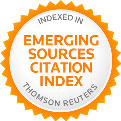Validación de la Escala de “Satisfacción de las Necesidades Psicológicas Básicas” y del Cuestionario de la “Regulación Conductual en el Deporte” al contexto español. (Validation of Psychological Need Satisfaction in Exercise Scale and the Behavioural Regulation in Sport Questionnaire to the Spanish context).
Resumen
El objetivo de este estudio fue adaptar y validar al contexto deportivo español la Escala de Satisfacción de Necesidades Psicológicas Básicas (PNSE) y el Cuestionario de la Regulación Conductual (BRSQ). Para ello se utilizó una muestra de 298 deportistas españoles, con una media de edad de 14 años. Se llevaron a cabo diferentes análisis factoriales confirmatorios, análisis de consistencia interna y de correlación. Tras los respectivos análisis factoriales confirmatorios, tanto la PNSE (2 = 222.62, p = .00, 2/g.l. = 129, CFI = .91, IFI = .92, TLI = .91, RMSEA = .04, SRMR = .08) como la BRSQ (2 = 824.56, p = .00, 2/g.l. = 558, CFI = .92, IFI = .91, TLI = .92, RMSEA = .04, SRMR = .06) presentaron valores adecuados. De igual forma, la consistencia interna obtenida de las respectivas dimensiones estuvo por encima de .70. Se observó una correlación positiva y significativa entre las tres necesidades psicológicas básicas, así como de éstas con la motivación intrínseca (hacia el conocimiento, consecución y estimulación), la regulación integrada y la regulación identificada. Por su parte, la necesidad de competencia correlacionó de forma negativa y significativa con la desmotivación, mientras que la necesidad de relación con los demás lo hizo con la desmotivación, la regulación introyectada y la regulación externa. Este estudio ha permitido proporcionar dos escalas válidas y fiables para evaluar la satisfacción de las necesidades psicológicas básicas y la motivación de los practicantes de actividad física y deportiva.
Abstract
The objective of this paper was to adapt and to validate to the Spanish sport context the Psychological Need Satisfaction in Exercise Scale (PNSE) and the Behavioural Regulation in Sport Questionnaire (BRSQ). The sample was 298 Spanish sportspersons, with a mean of 14 years old. Confirmatory Factor Analysis (CFA), internal consistency and correlation analysis were made. The respective CFAs showed that PNSE (2 = 222.62, p = .00, 2/g.l. = 129, CFI = .91, IFI = .92, TLI = .91, RMSEA = .04, SRMR = .08) and BRSQ (2 = 824.56, p = .00, 2/g.l. = 558, CFI = .92, IFI = .91, TLI = .92, RMSEA = .04, SRMR = .06) had good values. In the same way, the internal consistency of the respective dimensions was greater than .70. It was observed a positive and significant correlation between the three basic psychological needs, and between these ones and intrinsic motivation (to knowledge, achievement and stimulation), the integrated regulation and identified motivation. On the other hand, the necessity of competency correlated negatively and significantly with demotivation, while the necessity of relationship with others correlated with demotivation, introjected regulation and external regulation. This work has showed two valid and reliable scales for evaluating the satisfaction with the basic psychological needs and the motivation of practitioners of physical and sport activity.
doi:10.5232/ricyde2011.02602
--------------------------------------------------------------------------------------
Referencias/references
Deci, E. L., & Ryan, R. M. (2000). The ?what? and ?why? of goal pursuits: Human needs and the self-determination of behaviour. Psychological Inquiry, 11, 227-268.
http://dx.doi.org/10.1207/S15327965PLI1104_01
Hu, L., & Bentler, P. M. (1999). Cutoff criteria for fit indexes in covariance structure analysis: Conventional criteria versus new alternatives. Structural Equation Modeling, 6, 1-55.
http://dx.doi.org/10.1080/10705519909540118
Lonsdale, C.; Hodge, K., & Rose, E. A. (2008). The development of the Behavioral Regulation in Sport Questionnaire (BRSQ): Instrument development and initial validity evidence. Journal of Sport and Exercise Psychology, 30, 323-355.
PMid:18648109
Lynn, M., (1986). Determination and quantification of content validity. Nursing Reasearch, 35, 382-385.
http://dx.doi.org/10.1097/00006199-198611000-00017
Mallett, C. J.; Kawabata, M.; Newcombe, P.; Otero-Forero, A., & Jackson, S. (2007). Sport Motivation Scale-6 (SMS-6): A revised six-factor sport motivation scale. Psychology of Sport and Exercise, 8, 600-614.
http://dx.doi.org/10.1016/j.psychsport.2006.12.005
Ntoumanis, N. (2002). Motivational clusters in a sample of British physical education classes. Psychology of Sport and Exercise, 3, 177-194.
http://dx.doi.org/10.1016/S1469-0292(01)00020-6
Ryan, R. M., & Deci, E. L. (2000). Self-determination theory and the facilitation of intrinsic motivation, social development and well-being. American Psychologist, 55, 68-78.
http://dx.doi.org/10.1037/0003-066X.55.1.68
PMid:11392867
Spray, C. M., & Wang, C. K. J. (2001). Goal orientations, self determination and pupils? discipline in physical education. Journal of Sports Sciences, 19, 903-913.
http://dx.doi.org/10.1080/026404101317108417
PMid:11820685
Standage, M., & Treasure, D. C. (2002). Relationship among achievement goal orientations and multidimensional situational motivation in physical education. British Journal of Educational Psychology, 72, 87-103.
http://dx.doi.org/10.1348/000709902158784
PMid:11916466
--------------------------------------------------------------------------------------
Palabras clave/key words
Texto completo/Full Text:
PDF------------------------ 0 -------------------------
RICYDE. Revista Internacional de Ciencias del Deporte
![]()

Publisher: Ramón Cantó Alcaraz
ISSN:1885-3137 - Periodicidad Trimestral / Quarterly

